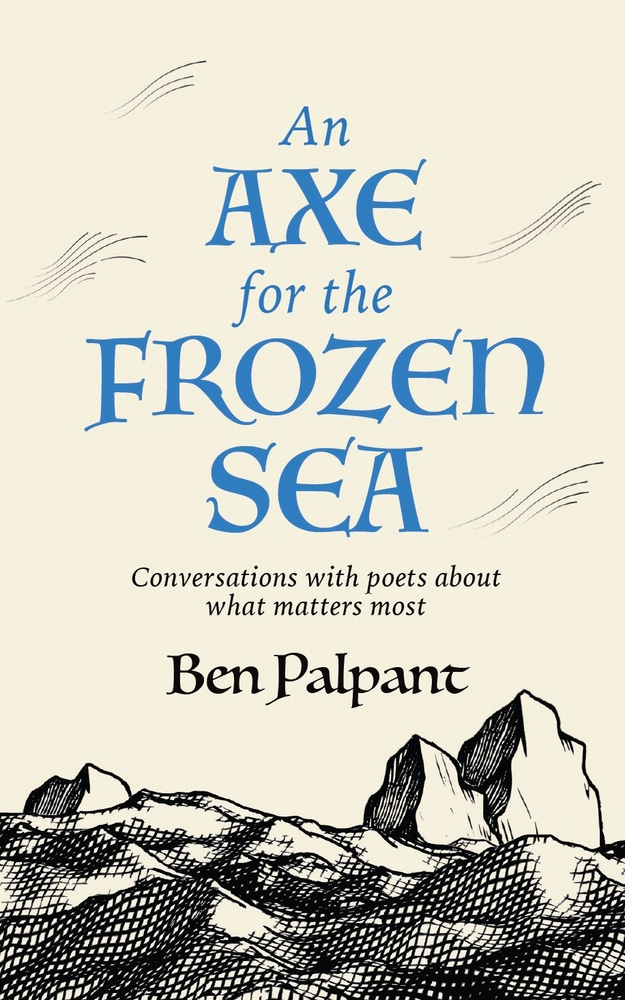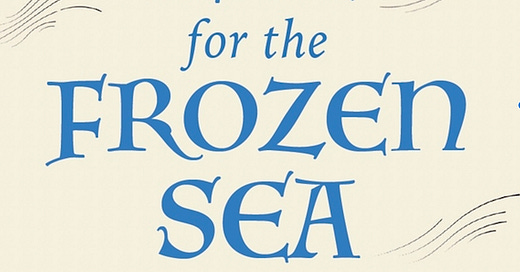A Jump Start on National Poetry Month
Let's read poetically together in April: An Axe for the Frozen Sea
Hello R&W community! And happy weekend. :)
In case you haven’t heard… I’m headed to Europe next week. (Eek!) I can’t wait. My husband is taking me on a belated birthday trip (it was in January. I turned 50). For two weeks in April we will be cruising up the Rhine River, starting in Basal, Switzerland and ending in Amsterdam, with 7 stops along the way. If that weren’t incredible enough, we’re staying two extra days on either end to explore on our own.
I’m beside myself.
I’m also working overtime to get R&W squared away while I’m gone—with both the podcast and my weekly posts. (This means Rhea’s been working overtime, too—Sorry Rhea!!). In a happy coincidence, April is National Poetry Month. So, I’m going to let the poets do the heavy lifting this month.
A National Poetry Month Read: An Axe for the Frozen Sea
It goes without saying that during National Poetry Month, we should all read more poetry. However, another way we can celebrate National Poetry Month is to celebrate those poets who gift us with their poetry.
Here is my invitation: Please consider reading along with me poet and memoirist, Ben Palpant’s book, An Axe for the Frozen Sea: Conversations with poets about what matters most. It’s a brand new release (March 2025) from Rabbit Room Press.

The title is fairly self-explanatory: Palpant interviewed eighteen poets and recorded his one-on-one conversations with them. He then compiled these interviews as individual chapters in a book. Palpant asks incredibly thoughtful questions, and the poets are warm, earnest, and generous with their answers. Many of the chapters end with selections of the poet’s own work. The range of topics covered is broad and deep, including: grief, hope, culture, faith, family life, the writing process, and the imagination.
Beginning with today’s post and for the first three Saturdays in April, I’d like to feature one of the poets from Palpant’s book. These “features” will be short and sweet. I will share a few of my favorite quotes from Palpant’s conversation with that poet.
After that, I will offer some number poems at the end: at least one by a poet whose work has influenced the featured poet’s work. And then, either another poem(s) by the featured poet, or a link to that poet’s work (this, out of concern for copyright violations).
For my last two posts in April, I’m going to do something brave: I’m going to share my own poetic responses to experiences I had in Europe. In keeping with one of R&W’s topics of late, these responses will be ekphrastic in style. (If you’re not sure ekphrastic is, read this post, or this post.)
So, now you know the plan for April.
On to this week’s An Axe for the Frozen Sea, poet…
Scott Cairns
Scott Cairns lives Washington State, overlooking Puget Sound. In reading his conversation with Palpant, I was most drawn to his thoughts on words, the English language as the best language for poetry, on uncertainty and poetry, and what concerns him for young poets today.
Here are a few of my favorite thoughts from Cairns:
“I’ve noticed,” he says, “that the poems I love most are poems that I can keep reading and opening becasue, during any given reading, I will have seen a primary sense of the word, but then see how the secondary and tertiary senses also figure into it. This is mostly why I started learning Greek and why I’m trying to learn a little Latin. It’s because, as you must know, the English language is the best language for poetry. It’s a museum for almost all the other languages. And so the etymological hauntings within an English word—of its Greek or Latin roots—may not be so overt, but they’re present. If you’re attentive to those ghosts, the poem keeps opening for you. It’s never the same poem with each reading. I want to make poems like that, poems that keep opening. We should be cognizant that writing poems isn’t about saying what you think you know; it’s really about constructing a scene of meaning-making—a field into which a reader can enter and make meaning with the poet. There really ought to be some ambiguity implicated in every line, I think.” (p. 3)
On having a disposition for uncertainty in order to read poetry:
“I don’t think [poetry’s] for everyone. I think you need to have a taste for uncertainty, which is a taste I think most people don’t share. Most people are profoundly burdened by practical matters. They may feel that they have no room for uncertainty, but that feeling keeps them from discovering, keeps them from a deep species of joy. Uncertainty is a great gift. I think uncertainty is a truer disposition that certainty. For instance, God is not reducible to anything we can say about God. God necessarily always exceeds what we might make of God; so, too, the truth necessarily always exceeds what we can narrowly define.” (p. 9)
On the next generation of writers:
“The only time I really get distressed about my students,” he replies, “is when marketing and self-promotion starts taking up too much of their attention and time. I think self-promotion is a really bad idea for a couple reasons—the greatest of which is that you start thinking that public attention is how you know your work is good. Applause and acclaim are not how you know something has quality. Witnessing all the self-promotion they’re doing, I feel very sad…. Truly, yes, just do the work. I’m not saying you shouldn’t send your work out for publication, but I spend probably an hour a month thinking about what I have on hand to send out, and who I should sent it to. Then I send it off and forget about it—I get back to work. (p. 10)
Poems
The first poem is by W.H. Auden, one of the poets Cairns says has influenced his own work. The second set of four poems is from Cairns’s collection, Idiot Psalms (I love, love this collection of Cairns’s work) The four poems featured below are published together on Poetry Foundation. You can read more of Cairns’s poetry at poetryfoundation.org
Law Like Love
By: W.H. Auden
Law, say the gardeners, is the sun, Law is the one All gardeners obey Tomorrow, yesterday, today. Law is the wisdom of the old, The impotent grandfathers feebly scold; The grandchildren put out a treble tongue, Law is the senses of the young. Law, says the priest with a priestly look, Expounding to an unpriestly people, Law is the words in my priestly book Law is my pulpit and my steeple. Law, says the judge as he looks down his nose, Speaking clearly and most severly, Law is as I've told you before, Law is but let me explain it once more, Law is The Law. Yet law-abiding scholars write: Law is neither wrong nor right, Law is only crimes Punished by places and by times, Law is the clothes men wear Anytime, anwhere. Law is Good-morning and Good-night. Others say, Law is our Fate; Others say, Law is our State; Others say, others say Law is no more. Law has gone away. And always the loud angry crowd, Very angry and very loud, Law is We, And always the soft idiot softly Me. If we, dear, know we know no more Than they about the Law, If I no more than you Know what we should and should not do Except that all agree Gladly or miserably That the Law is And that all know this, If therefore thinking it absurd To identify Law with some other word, Unlike so many men I cannot saw Law is again No more than they can we suppress The universal wish to guess Or slip out of our own position Into an unconcerned condition. Although I can at least confine Your vanity and mine To stating timidly A timid similarity, We shall boast anyway: Like Love I say. Like love we don't know where or why, Like love we can't compel or fly, Like love we often weep. Like love we seldom keep.
Idiot Psalms By: Scott Cairns 1 A psalm of Isaak, accompanied by Jew's harp. O God Belovéd if obliquely so, dimly apprehended in the midst of this, the fraught obscuring fog of my insufficiently capacious ken, Ostensible Lover of our kind—while apparently aloof—allow that I might glimpse once more Your shadow in the land, avail for me, a second time, the sense of dire Presence in the pulsing hollow near the heart. Once more, O Lord, from Your enormity incline your Face to shine upon Your servant, shy of immolation, if You will. 2 A psalm of Isaak, accompanied by baying hounds. O Shaper of varicolored clay and cellulose, O Keeper of same, O Subtle Tweaker, Agent of energies both appalling and unobserved, do not allow Your servant's limbs to stiffen or to ossify unduly, do not compel Your servant to go brittle, neither cramping at the heart, nor narrowing his affective sympathies neither of the flesh nor of the alleged soul. Keep me sufficiently limber that I might continue to enjoy my morning run among the lilies and the rowdy waterfowl, that I might delight in this and every evening's intercourse with the woman you have set beside me. Make me to awaken daily with a willingness to roll out readily, accompanied by grateful smirk, a giddy joy, the idiot's undying expectation, despite the evidence. 3 A psalm of Isaak, whispered mid the Philistines, beneath the breath. Master both invisible and notoriously slow to act, should You incline to fix Your generous attentions for the moment to the narrow scene of this our appointed tedium, should You—once our kindly secretary has duly noted which of us is feigning presence, and which excused, which unexcused, You may be entertained to hear how much we find to say about so little. Among these other mediocrities, Your mediocre servant gets a glimpse of how his slow and meager worship might appear from where You endlessly attend our dreariness. Holy One, forgive, forgo and, if You will, fend off from this my heart the sense that I am drowning here amid the motions, the discussions, the several questions endlessly recast, our paper ballots. 4 Isaak's penitential psalm, unaccompanied. Again, and yes again, O Ceaseless Tolerator of our bleaking recurrences, O Forever Forgoing Foregone (sans conclusion), O Inexhaustible, I find my face against the floor, and yet again my plea escapes from unclean lips, and from a heart caked in and constricted by its own soiled residue. You are forever, and forever blessed, and I aspire one day to slip my knot and change things up, to manage at least one late season sinlessly, to bow before you yet one time without chagrin. Source: Poetry (January 2009)
Next week: Luci Shaw
Are you familiar with Scott Cairnes’s poetry? Do you have a favorite? What have you read poetically this week that’s made an impact on you?
Thanks everyone!
Until next week: Read wide, read well. Live always in witness to the Great Story.





I can’t wait to read your poetry. I read Carins’s chapter this morning and loved it. I especially liked his poem at the end. It made me think of my husband. 😂